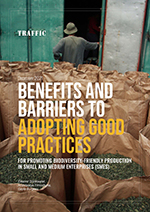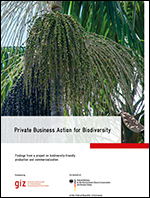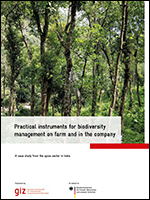Private Business action for Biodiversity
Private enterprise has an important role to play in countering contributory factors to the loss of biodiversity. This global project is supporting methods and instruments to ensure biodiversity-friendly production and marketing, and compiling the insights obtained for use by private- and public-sector actors. An initial orientation phase was used to identify promising approaches from agriculture and forestry, including capacity development, impact monitoring, management tools, traceability and financing instruments. The implementation phase focused on model-based field trials and the further development of selected methods and instruments, with priority being given to small and medium-sized businesses. A best-practice approach was applied to consolidate project findings for the use of private- and public-sector actors alike. The examples were also being used in consulting services for policymakers.
- Countries
- Brazil, India, Mexico
- IKI funding
- 4,100,000.00 €
- Duration
- 09/2016 till 12/2021
- Status
- completed
- Implementing organisation
- Deutsche Gesellschaft für Internationale Zusammenarbeit (GIZ) GmbH
- Political Partner
-
- Ministry for Agriculture and Rural Development (SADER) - Mexico
- Ministry of Agriculture, Livestock and Supply - Brazil*
- Ministry of Environment, Forest and Climate Change (MoEFCC) - India
- Ministry of Environment and Natural Resources (SEMARNAT) - Mexico
- Implementing Partner
-
- Global Nature Fund (GNF)
- Union for Ethical BioTrade (UEBT)
State of implementation/results
- Project completed.
- The project investigates which instruments, processes and mechanisms are particularly suitable for promoting biodiversity-friendly production and marketing.
- In mid-2020, a monitoring tool for biodiversity action plans developed jointly with the Global Nature Fund and the Union for Ethical Biotrade was presented to the public. It is now in the testing phase.
- Key findings of the project were presented in an online seminar series organised by the Global Partnership for Business and Biodiversity (GPBB). (Link to the online seminar series: www.cbd.int/…)
- Since 2018, the project has been working with the Union for Ethical BioTrade (UEBT) to set up a multi-stakeholder initiative on carnauba wax (Initiative for Responsible Carnauba) in north-eastern Brazil, developing good practices for the collection of the natural raw material and preparing them for the sector in the form of a guide and educational videos. Four local wax companies are supported in implementing the UEBT principles for improved social and biodiversity standards (as of 08/2020). (Link to the initiative: www.ethicalbiotrade.org/… , to the guide: www.international-climate-initiati-ve.com/… and to the videos: www.acaatinga.org.br/… )
- A baseline study summarises key findings on socio-economic conditions and the state of biodiversity in the two main production areas of Piauí and Ceará (
- On areas of the AmazonBai cooperative, where açaí berries are collected or cultivated in the Brazilian Amazon, the project, together with the Forest Stewardship Council (FSC), is testing how to measure the impact of sustainable forest management on biodiversity and CO2 storage. (Further information: fsc.org/… and FSC certificate for biodiversity: fsc.force.com/…)
- In India, the project has developed and tested "Biodiversity Action Plans" for the cultivation of spices (cardamom, nutmeg, pepper, cinnamon and chilli) in the biodiversity hotspot Western Ghats together with the Global Nature Fund (GNF) and other partners (www. www.globalnature.org/…). These are tools that producers can use to plan, implement and monitor biodiversity-friendly measures. The guides can be downloaded from the IKI library. In early 2020, the Indian government officially launched the National Sustainable Spice Programme, which takes up recommendations and training materials from the project.
- In Mexico, the project has analysed the costs and benefits of producing biodiversity-friendly agave distillates under the Bat-Friendly Initiative. This includes monitoring improvements in habitat protection for bats as agave pollinators. A market study on biodiversity-friendly agave products was completed in the first half of 2020 and will be used for further dialogue and cooperation with producers. In addition, the registration of the "Bat-Friendly" brand in Mexico was achieved with the support of the project.</li>
Latest Update:
12/2024
Further links
- Factsheet: "Private Business Action for Biodiversity Good agricultural, collection and sourcing practices for the Brazilian carnauba sector"
- Factsheet: "Private Business Action for Biodiversity Biodiversity - Friendly Production and Commercialization in the Indian Spice Sector"
- Factsheet: "A new tool to measure how forest management contributes to biodiversity protection"
- Factsheet: "Good agricultural, collection and sourcing practices for the Brazilian carnauba sector"
- Learning videos for the carnauba sector in Brazil (in Portuguese)
- Factsheet: "Private Business Action for Biodiversity Biodiversity - Biodiversity Action Plan Monitoring Tool: An easy-to-use way to monitor biodiversity actions in farms and wild collection areas
- Factsheet: "Socio-economic conditions and biodiversity status in carnauba production areas"
- Factsheet: "Carnauba in north-eastern Brazil - A Case Study"
- Factsheet "Private Business Action for Biodiversity"
- Factsheet: "Performance and Impact Monitoring Tool for Biodiversity Action Plans"
Project relations
Legend:
The link has been copied to the clipboard
Related Publications
-

-
07/ 2019 | Guideline
Manual on Biodiversity Action Plan for Chili Production
Englisch | English (PDF, 4 MB)
















